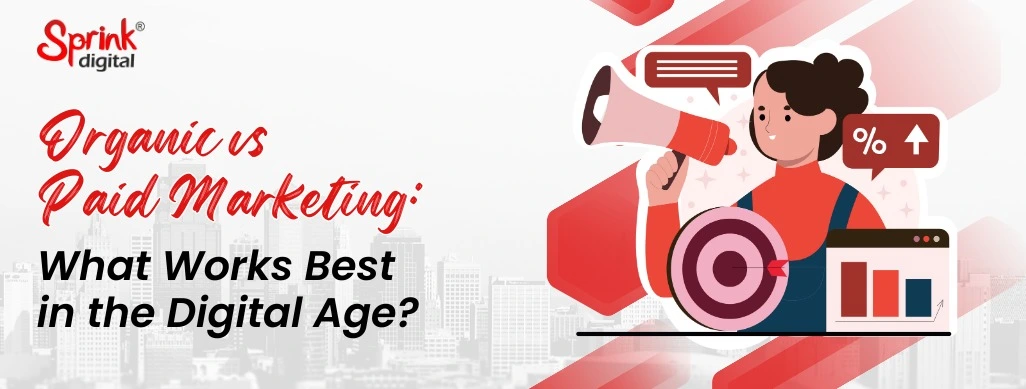
Quick Summary:

Have you ever wondered why your competitor’s ad shows up first on Google, while your blog is buried on page three? Or maybe you’ve poured time and effort into social media posts, but your reach is still stuck in the single digits.
Choosing between organic vs paid marketing can feel like gambling in this age of digital marketing. Should you keep writing, hoping Google picks it up or just pay to get noticed?
Continue to read on this blog as we are breaking down both the strategies, showing where they shine or where they break, and how smartly you can blend the two for maximum impact.
Organic marketing is a long game, and it is all about earning attention over time and naturally. Instead of paying for eyeballs, you create valuable content that automatically draws people in. Such as:
Organic marketing builds trust, authority, and a community. You are interpreting someone’s day by playing ads, instead you are answering the questions or solving someone’s problem.
Paid marketing is like a shortcut on a crowded highway; it gets you in front of your audience fast. Using platforms like Google Ads, Facebook Ads, or the sponsored content that you pay to get seen. This is ideal for:
According to Sprink Digital, a strategic paid search agency can help craft high converting campaigns that puts your brand in front of the right audience just when they are searching for it.
Here is the detailed table below explaining the key difference between organic vs paid marketing:
| S. No. | Criteria | Organic Marketing | Paid Marketing |
| 1 | Cost | Low (time intensive) | High (money intensive) |
| 2 | Control | Less control (algorithms) | High control (targeting) |
| 3 | Longevity | Long-term impact | Short-term impact |
| 4 | Speed | Slow and steady | Fast and immediate |
| 5 | Trust Factor | High (authentic) | Moderate (sponsored) |
Organic marketing should be your go to strategy if:
For example, if you are head of a content marketing company then organic strategies like blogs, social content, and guides are your bread and butter which is your living sustenance.
You can use the paid marketing strategy if:
Hiring a reliable paid search agency ensures your ad spend is used wisely, so you are not just paying for the clicks but for actual results.
Here’s the truth: the smartest brands don’t choose between organic or paid marketing, instead they combine them.
Consider this:
You can also use paid ads for message testing, then use that data to refine your organic content. It is a feedback loop that gets better with time.
Both strategies can generate strong ROI if you know what to monitor.
Tracking organic performance would include:
Tracking paid performance would include:
Pro tip: Make use of tools such as Google Analytics 4, SEMrush, and Facebook Ad Manager for proper clarity in what is going well.
Sprink Digital and most top digital agencies tend to recommend going with paid first as a source of quick insight and lead generation while developing organic content on the side.
A fully paid search company will typically be able to sell you content strategy services, thus allowing a one-stop shop for both sides of the equation.
It really depends on your goals. If you want to build loyal audiences slowly and steadily, lean in organic. Need traffic or conversions yesterday? Paid is your friend. Want to win the digital game? Do both, and let them support each other. At the end of the day, organic builds your brand, while paid marketing gets you found. And when do these two worlds collide? That is where the real magic happens.
Need help deciding what’s right for your brand?
Whether you are a small business, a startup, or an established brand, digital expertise from a paid search agency or a content marketing house gives that one-stop answer.
Let your marketing dollars (and effort) really work for you.
Join our growing community and get inspiring articles.
Our highly trained talented teams are committed to providing you with top-level, technical or any other support 24*7.
Ready to get started? Give us a call.